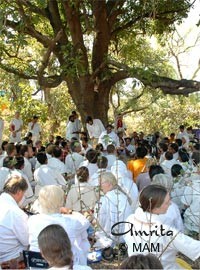She who does not know, but knows and does not know as well

Bharata Yatra 2006
22 February 2006 —the corner of a cotton field just off NH 7, five km north of the border separating Andhra Pradesh and Maharashtra
Driving north from Hyderabad to Nagpur, the country becomes even more arid and hot. The rocky hills that had previously marked the landscape dwindle in appearance, giving way to a land that is utterly flat and, more often than not, barren. Only a few crops will grow in such conditions—chiefly wheat and cotton, neither of which provides any visual splendour. Yet the bleakness of the region makes the appearance of the occasional sunflower garden all the more dramatic—one is suddenly overwhelmed by acres of yellow.
And then, as soon as one crosses from Andhra Pradesh into Maharashtra, things change. Trees are reintroduced, grass appears, rivers start winding through the land. With each passing kilometre, the world seems to rejuvenate more and more.
It was just five kilometres north of the Maharashtra border that Amma’s caravan stopped for lunch. Amma got down, walked into the corner of a cotton field and sat down under a mango tree. Soon everyone sat down around her.
Wisps of cotton were floating in the air, and a small blonde boy from France captured one and made an offering of it to Amma. Everyone sat watching Amma adore it. In Amma’s hands, the wisp was made precious. It was as if, to Amma, nothing could have been more miraculous or beautiful.
Eventually Amma said, “Those who know something should tell those who don’t know.”
Maybe it was just a joke, but for those who have studied the Upanishads, Amma’s words had a haunting ring to them.

In Kenopanishad, in order to explain that the Ultimate Truth is beyond the scope of the mind and cannot be known in the way an object can, the Guru tells his disciples, “If you think, ‘I have known Brahman well enough,’ then you have known only the very little expression that It has in the human body and the little expression that It has among the gods.” He then suggests that they contemplate further. After doing so, one disciple announces that he, indeed, has finally realized: “I do not think, ‘I know Brahman well enough.’ It’s not that I do not know… I know and I do not know as well. He among us who understands that utterance, ‘Not that I do not know; I know and I do not know as well,’ knows Brahman.”
At first, everyone sitting around Amma kept quiet, but then one woman from America stood up. “Would Amma tell us about the beauty of the state of God realization, so as to inspire us to make efforts towards the Goal?”
Did she have any idea how perfectly in line with the Upanishad her question had been? Being the only one in the cotton field falling into neither the category of “those who know” nor of “those who don’t know,” Amma alone was truly fit to speak on the subject.
Upanishads don’t only take place in the Himalayas in the ancient past, but anytime a seeker of Truth comes to a Spiritual Master with an earnest desire to know Reality.
Amma said, “The bliss of that state is always there within us. Like the value of a 500-rupee note, it can neither be increased nor decreased. This is the view of Vedanta. However, from the viewpoint of a devotee, if you want to win the lottery, you must first pay for the ticket. The price of the ticket is the surrendering of our current state of mind.”
Amma then gave another example to show how grand the payoff is when one surrenders the worthless ego: “People say, ‘I own this tiny plot of land,’ but if you can give up your attachment to your plot, the whole world becomes yours. The attitude of ‘I’ and ‘mine’ is the obstacle. It must be given up.”
Amma then compared the experience of one who has attained God realization to that of a lover in the presence of their beloved. But whereas the bliss and happiness of the lover is limited to the time he is in the presence of his beloved, for one who has attained God realization the Beloved is everywhere—within and without—and thus similarly ever-present is his bliss.
In order to help the lady—who was in her sixties—understand, Amma asked her to remember her first boyfriend and how blissful the time she had spent with him had been. “Whether he was handsome or not did not matter to you,” Amma said. “Because where there is love everything is beautiful. However, whereas worldly love fades and takes our perception of beauty along with it, in God realization the bliss and beauty are eternal. When the mind becomes beautiful, we see beauty in everything.”
To illustrate what happens when we become attached to the relative beauty of objects, Amma put forth the example of someone marrying Ms. Universe. When they get married, he is in bliss, as he has finally won the love of his life. But at the same time, many boys across the world become depressed upon learning that she is no longer available. “Perhaps they even start taking medication for depression,” Amma said. But after some time, the husband and Ms. Universe begin fighting, and the husband also begins taking anti-depressants. Amma then further bore out the irony by saying how, upon learning of their divorce, the hope of the boys throughout the world is reawoken.
Amma then told everyone they should either turn inward and look for God there or try to see God in everything in the world around them.
She then gave two examples of devotees who followed the latter path: the gopis of Vrindavan and Sage Narada. The gopis saw Krishna in everything and everyone, and Sage Narada never took a breath or a step without repeating his mantra.
“When we become established in love, everything becomes beautiful,” Amma said. “Our goal should be to see beauty in all. The Lord’s creation is wonderful and beautiful, and if you can see the Lord in all, every minute will be wonderful and beautiful. If we can maintain that remembrance, nothing else is needed.”
—Sakshi
